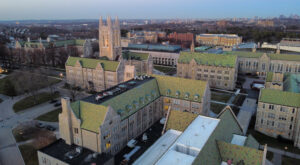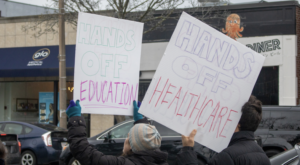Wickedness, arrogance, pride, Donald Trump: what do these four nouns have in common? If you ask one of my professors, a hell of a lot. While discussing the adversaries of God as portrayed through ancient Jewish texts, my professor found it appropriate to insert the name of a presidential candidate. It was a statement as equally shocking as it was casual—my professor seemed to expect the class to conform to his opinion to the longstanding lessons of the Old Testament.
This moment is not unique in the classrooms of Boston College. On numerous occasions, I have become distracted by an unrelated imposition of professorial political certitude. When such political address comes in the form of a punctuated, “humorous” aside, it can pack an agitating punch to both dissidents and supporters alike. Off-putting jokes and jabs are insulting to students (even if we agree with them) and may lead us to question the reputability of the professor’s subsequent lessons. There are, however, varying ways in which professors at BC incorporate their political viewpoints in the classroom, some of which are better than others.
Indeed, there are professors who are more subdued about their sharing tactics (or lack thereof). There is the professor who “unwillingly” exposes his political beliefs (“I hate to impose my beliefs, but … ”), or the professor who dodges disclosing her political opinion by framing it as factual evidence (“I am just showing you the facts, and you can decide what to think … ”). The lattermost example is noteworthy because it occurs when political implications intertwine with syllabus material—an inevitable occurrence as courses begin to unravel socioeconomic inequality, human rights, and environmental crises.
Political opinion often involves deep-seeded moral values, and therefore its discourse presents a challenge to professors whose lessons are related to popular political topics. Professor Timothy Crawford of the political science department is no stranger to this responsibility. He teaches courses that are often explicitly relevant to contemporary political events, and therefore views it as inevitable for his personal political biases to “creep in.” For this reason, he transparently shares his stance on topics in which he is well versed. “I sometimes present [my perspective] to students overtly as ‘here is my view.’ I then usually try to situate my view in the context of a debate, and do some justice to the alternative perspectives,” Crawford said in an email. Crawford discloses his level of uncertainty/confidence regarding these topics to students, citing reasons and evidence behind his thinking.
I find Crawford’s approach to incorporating personal viewpoints in political science classrooms as a fair model for BC professors of other disciplines who wish to do the same. Crawford believes that regardless of a professor’s expertise, when discussing big issues of the day, it does not breach professional acceptability for professors to openly share their political viewpoints with students. He believes that it is reasonable to expect faculty to express political attitudes during momentous junctures, citing events such as assassinations of major figures like Osama Bin Laden or the entrance of the United States into war with another country. I agree that such sharing is acceptable, and aim to stress the importance that professors carefully consider just methods of introducing it. The success of that introduction is rooted in the professor’s willingness to allow it to blossom into discourse. If a professor’s syllabus timeline does not allow for inclusive, class-wide debate, it’s best to leave any political commentary out.
Discerning political opinion from coursework becomes messier when the class topic is implicitly related to politics. In disciplines such as sociology and environmental science, the underlying foundation of the class is often directly associated with one side of a disputed bipartisan issue.
Stephanie Schopf, a senior sociology major and MCAS ’16, recalls a time when a professor was remarkably upfront about his political stance with students. On the first day of an African Diaspora Studies elective, Schopf said, the professor presented a series of disputable statements such as, “men and women have equal rights today,” “homosexuals and heterosexuals have equal rights today,” and “racism does not exist today.” He went on to recommend that his class would be a poor fit for any student who interprets these statements as true. Schopf, who identifies as “very liberal,” found this practice useful in that her professor openly put his opinions on the table, and then entered into further discourse under the assumption that white, heterosexual men have the advantage. Yet one can’t help but wonder about those students who found their interests impossible to pursue because of the professor’s join-or-leave tactics. Had he not stamped out competing viewpoints in his class, it is possible that healthier, more fruitful class-wide debate could have occurred.
While a level of transparent sharing may be appropriate—if not necessary—in some classes, it is possible that the same level of transparency is not relevant in all disciplines. Communication major Kelly Mallory, MCAS ’16, does not find it appropriate for professors to express their political viewpoints under any circumstance. “The professor is the academic filter through which classroom learning takes place,” she asserted. “So, professors’ opinions can severely dictate how information is learned, absorbed, and then used to make decisions in the future.” Ultimately, Mallory believes that when a professor allows any level of political bias to infiltrate into a learning environment, he or she may be depriving students of realizing total gains from the class by making them feel uncomfortable.
The bottom line is that irrelevant political commentary distracts students from coursework. Whether I want to stand on my desk and applaud the likeness of Donald Trump to Satan, or storm out of the classroom in disgust, the point is that I lose focus. Still, it is not necessary to enact a general prohibition of political discourse in Boston College classrooms. With Professor Crawford’s approach in mind, it is possible for professors to directly address their political viewpoints to students in an intentional and disciplined manner. As the primary and presidential elections approach, I challenge professors to consider methods fostering an environment where political matters can be respectfully shared and debated.
Featured Image by Francisco Ruela / Heights Graphics




